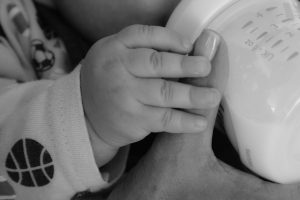To an outsider, breastfeeding might seem the most simple and instinctive behaviour.
“Breast is best” was the refrain for many years, with bottle feeding or using formula often looked down or seen as unworthy substitutes. A more empathetic approach understands that, like most things, breastfeeding takes time and practise to get right – and even then, life can throw curveballs your way.
There are numerous reasons why parents might find breastfeeding a challenge. It’s a sensitive topic, and has been subject to a lot of discussion over the years; even if a parent does manage to “do it right” there is still the attached stigma of breastfeeding in public, with parents forced to retreat to toilets and hidden corners to complete this most natural of tasks. People will always have an opinion on which method is best, but often this journey is a very personal one, and no two breastfeeding experiences are the same.
Breast milk contains the vitamins and minerals vital for a baby’s nutritional needs; it also helps protect a baby against infections and can significantly reduce the risk of them contracting certain illnesses and conditions. However, having a steady milk supply that will meet your baby’s appetite is not a guarantee, and some parents struggle to produce enough milk – or their supply might dry up entirely, whether due to stress, illness, or other factors.
Certain medications are prohibited while breastfeeding, such as herbal remedies, certain pain relief and antihistamines. Premature babies are particularly sensitive, and there are even more restrictions on what a nursing parent can and cannot take. This is where breastfeeding support comes in. One form of support is making breast milk more easily accessible for those that may struggle with the supply for whatever reason: breast milk donations.
CommunityAd had a lovely chat with Canterbury mother Emma Johnson about how she found herself donating her breast milk and how it works.
How did you come to be in a position where you had milk to donate?
I was in a position to donate my milk because I had a premature baby at 27 weeks, weighing only 1lb 6oz. She was in the NICU for a long while – 112 days!
I couldn’t breastfeed when she was tiny, she was being tube-fed throughout her stay at the NICU, but eventually nearer the end of the NICU journey I could breastfeed. I continued to express my milk and freeze it all, the hospital freezer was full of my milk so I had to buy a new freezer for home just for my milk,
which is now full.
What was the process for donation?
To donate the milk, you’ll have to fill in a few forms, then they’ll arrange some blood tests and collection which then will go back to them to be processed.
Are there any restrictions on who can donate milk?
There are restrictions, it all depends on caffeine intake, drugs, antibiotics, alcohol, and injections that people are on.
How long does breast milk last for?
Breast milk can last up to 48 hours in the fridge, and six months in the freezer.
Which local hospitals or charities accept donations?
Hospitals no longer accept donations; it all has to go to a milk bank.
How can someone prepare for donation, if that’s an option they’re interested in?
If people are interested, search for your local milk bank, they’ll send you out a questionnaire and begin the process.




